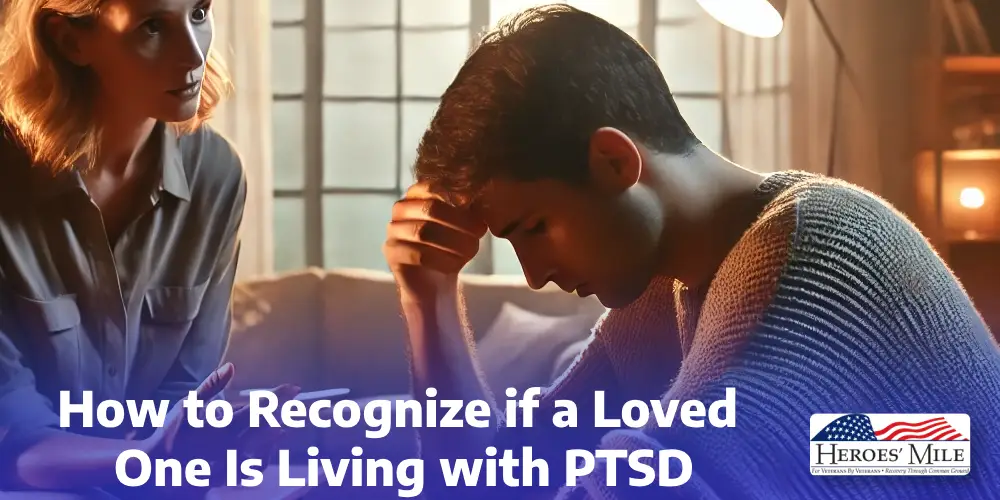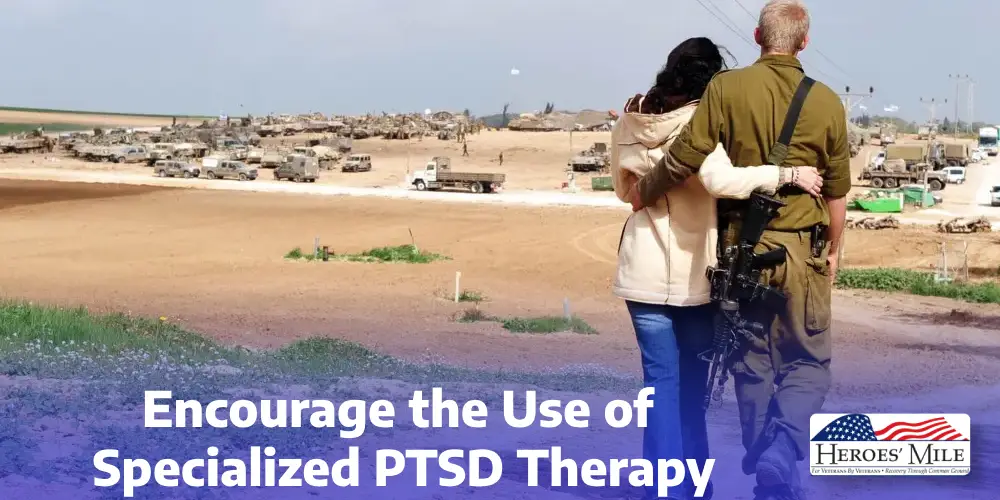Post-Traumatic Stress Disorder (PTSD) can deeply affect those who have experienced trauma, yet recognizing the signs in a loved one isn’t always easy. Understanding the emotional, behavioral, and physical symptoms of PTSD is the first step in offering support and seeking professional help. If you suspect that someone close to you is struggling,

How to Recognize if a Loved One Is Living with PTSD
Recognizing the Signs and Symptoms of Combat Stress and Post-traumatic Stress Disorder
Is Combat Stress and Post-traumatic Stress Disorder the Same Thing?
Combat stress is sometimes mistaken with post-traumatic stress disorder, or PTSD, which can develop after a stressful experience such as a war, an attack, or a natural catastrophe. While many of the symptoms of the two illnesses are similar, they are not the same.
Combat stress is a normal reaction to the traumatic situations that military personnel are exposed to. It typically lasts for a short length of time. After service, a person has been home for a few months, or even weeks, symptoms usually disappear.
Post-traumatic stress disorder, on the other hand, is more severe. It frequently causes a person’s daily commitments to be disrupted, necessitating more intense therapy. PTSD typically necessitates sessions with a mental health practitioner as well as techniques for dealing with complicated feelings.
A person diagnosed with PTSD typically displays specific symptoms following a traumatic event as part of their combat backgrounds, such as frequent nightmares or flashbacks.
What You Should Know About Post-Traumatic Stress Disorder (PTSD) Symptoms
PTSD, like many other mental health conditions, has no specific symptom. There are a number of symptoms that might be linked to the disease. Many of these, such as terrible nightmares, insomnia, irritability, and so on, may appear to be relatively innocuous on their own.
However, when combined with other symptoms, a health professional may determine that more investigation is required to rule out or confirm PTSD as a probable cause.
Post-Traumatic Stress Disorder (PTSD) Symptoms
Repetitive, unwelcome, and frequently intrusive recollections of a traumatic incident, unpleasant dreams, feeling emotionally distant, intense guilt, concern, furious outbursts, and avoiding circumstances that remind you of the trauma are all symptoms of PTSD.
If your loved one is experiencing one or more of the following for an extended period of time after a traumatic incident, you may be suffering from PTSD:
- Flashbacks
- Nightmares
- Overwhelming guilt or shame
- Intrusive thoughts about the triggering event
- Frequent dreams that seem to be tied or related to trauma
- Exposure to objects that remind you of trauma causes intense anguish
- Physical or physiological reactions to the event’s memories
- Intrusive recollections of traumatic encounters
- Specific activities that remind them of the occurrences may attract or repel certain people
- Any dissociative reaction causes the victim to believe that trauma, or portions of it, is reoccurring
- Psychological discomfort for a long time when reminded of the incident
If two or more of the following symptoms are being shown, your loved one may also be suffering from PTSD:
- Unable to recall a crucial aspect of the trauma in ways that are not connected to head injury, alcohol, or drug usage.
- Fear, anger, guilt, or other powerful unpleasant feelings that persist
- Unwavering expectations about themselves and other people
- The incapacity to feel happy
- They are distancing themselves from other people and situations
- Reduced or absent interest in activities or events that you would typically participate in
- A misplaced feeling of responsibility for the traumatic events’ origin or consequences – the blame might be focused either inside or outside
How to Support Someone Suffering from Post-Traumatic Stress Disorder (PTSD) as a Result of War
Treatment from a competent therapist is a crucial part of recovering from PTSD. Friends and family, on the other hand, are vital in assisting soldiers with PTSD. Appropriate social support can help someone with PTSD avoid harmful coping methods like drugs or alcohol.
If you have a loved one who has had a terrible incident that has resulted in PTSD, there are many things you can do to help them, even if you don’t fully get their situation. Here are a few suggestions for assisting someone who has post-traumatic stress disorder (PTSD) as a result of their service in the military.
Offer Social Assistance
For warriors who have PTSD, stability is crucial. While you may not always be able to drop everything at the drop of a hat, you should make an effort to be a regular and consistent presence in your loved one’s life.
Listen Attentively
Encourage your loved ones to speak out about what they saw or experienced if they are soldiers with PTSD. Maintain a non-judgmental attitude while listening, and offer them your full attention.
If you must ask a question, do so in a non-intrusive manner. Unless your loved one requests explicitly it, refrain from offering advice or thoughts. Allow enough time and space for your loved ones to speak what they need to say without hurrying them.
Instill a Sense of Security
For individuals who have PTSD, stability is crucial. While you may not always be able to drop everything at the drop of a hat, you should make an effort to be a regular and consistent presence in your loved one’s life.
Respect the individual’s privacy and recognize that everyone recovers at their own pace. Everything your loved one says to you should be treated as entirely private.
Encourage the Use of Specialized PTSD Therapy
Encourage your loved one to seek and enroll in specialist therapy for PTSD in individuals if they have not already done so. This can assist not just with PTSD symptoms but also with the long-term risk of acquiring other mental-health issues and symptoms.

Encourage the Use of Specialized PTSD Therapy
Video
7 Tips To Help Someone With PTSD, Mental Health 101, Kati Morton
Today I’m sharing 7 ways we can help someone with PTSD (also known as post traumatic stress disorder) because, frequently I’m asked by members of our community how they can help those they love, or they feel like they are always doing the wrong things and want to know how to make it right. Mental Health 101 is a new series where I talk through the specifics of mental health subject matters, everything from dissociation, social media addiction, social anxiety, depression and more. In each of these episodes, I will clearly break down questions like “What is PTSD?” or “Signs of addiction?” and more.
Podcast
Buddhist Woman Cures 53 years of CPTSD Naturally (Even Her Doctor Couldn’t Believe it)
From CPTSD and daily seizures to complete freedom…my guest Mimi has done some incredible things. From undergoing surgery with nothing but a Buddhist mantra (no pain meds), to curing her nightmares and trauma induced seizures.
FAQ
- What are common emotional symptoms of PTSD?
People with PTSD often experience anxiety, depression, mood swings, emotional numbness, or intense feelings of guilt or shame. They may also have difficulty expressing emotions or connecting with others. - How does PTSD affect daily behavior?
PTSD can cause avoidance of people, places, or activities that remind them of trauma. It may also lead to sleep disturbances, heightened irritability, or increased dependence on substances like alcohol or drugs. - Can PTSD cause physical symptoms?
Yes, PTSD can manifest physically, causing headaches, digestive issues, chronic fatigue, muscle tension, and a heightened startle reflex due to hyperarousal. - How can I support a loved one with PTSD?
Providing a safe space for open conversation, encouraging professional treatment, avoiding judgment, and being patient are key ways to support a loved one with PTSD. - When should someone with PTSD seek professional help?
If symptoms persist for more than a month, interfere with daily life, or lead to self-destructive behaviors, professional intervention at a mental health facility like Heroes’ Mile Behavioral Hospital is recommended.
